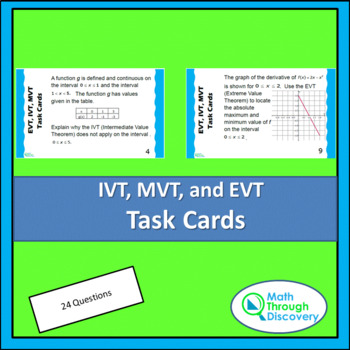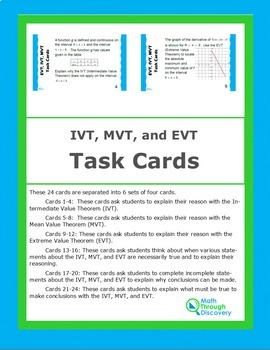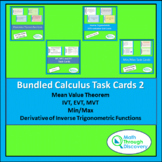Calculus - IVT, EVT, and MVT Task Cards
What educators are saying
Also included in
- This bundle is made up of four sets of task cards available separately in my store:- Mean Value Theorem- IVT, EVT, MVT- Min/Max- Derivative of Inverse Trigonometric FunctionsPrice $20.00Original Price $25.00Save $5.00
- This bundle includes the following task cards:1. Limits2. Derivative of Inverse Trigonometric Functions3. Mean Value Theorem4. All Types of Derivatives5. Min/Max6. IVT, MVT, EVT7. Riemann Sums8. ContinuityEach set of these cards can be purchased separately in my store.Price $40.80Original Price $51.00Save $10.20
Description
These twenty-four task cards are separated into six sets of four cards. Each of the sets of cards has a different focus.
• In cards 1-4 the students are asked to explain why the can or cannot use the Intermediate Value Theorem (IVT) to make a conclusion about a function.
• In cards 5-8 the students are asked to consider how the Mean Value Theorem (MVT) might be applied to functions.
• In cards 9-12 students are asked to explain their reasoning with the Extreme Value Theorem (EVT).
• In cards 13-16 students are asked to think about when various statements about the IVT, MVT, and EVT are necessarily true and to explain their reasoning.
• In cards 17-20 students are asked to complete some incomplete statements about the IVT, MVT, and EVT to explain why conclusions can be made.
• In cards 21-24 students are asked to explain what must be true to make conclusions with the IVT, MVT, and EVT.
All the cards require the students to communicate their understanding of the three important theorems in calculus. This is a skill required in the new Calculus AP Framework that was recently released.
There are several ways you can differentiate the lesson:
• The cards can be set up in 6 stations and students can be asked to complete either 1, 2, 3, or 4 cards in the set.
• Since the cards focus on the three theorems (IVT, MVT, and EVT), you could separate the cards by topic and only assign those questions on a specific theorem.
• Separate the class into four groups and give each group one card from each set. Ask each group to make a presentation to the rest of the groups on how they would solve their six problems.
A recording sheet in provided for students to record their answers to each task card.






